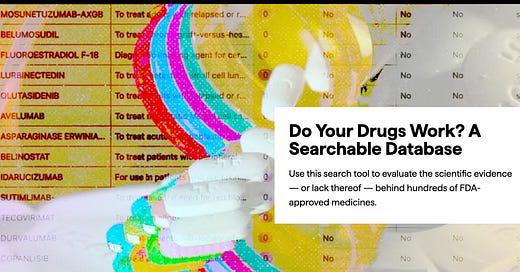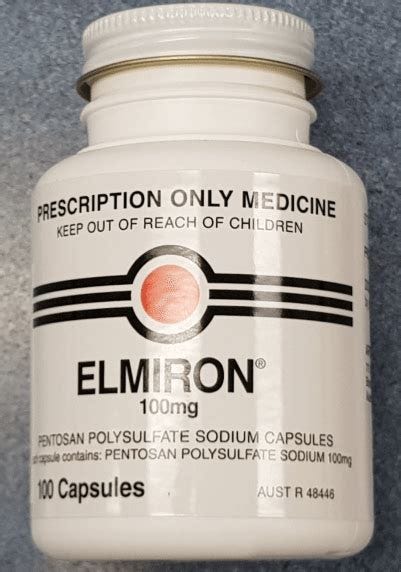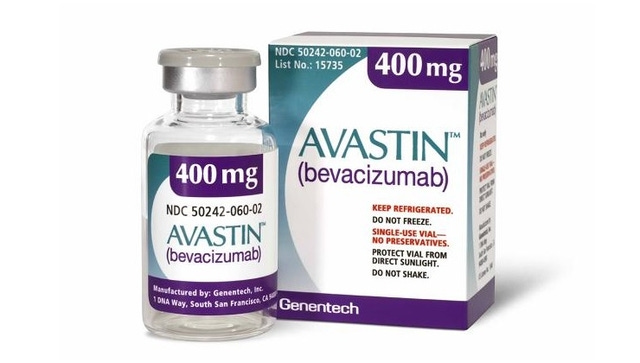In a 2015 study in the Journal of Urology, researchers randomly assigned 368 adults a daily dose of pentosan polysulfate sodium (Elmiron) or placebo.
After 24 weeks, pentosan polysulfate sodium's effectiveness compared to the placebo was not statistically significant.
Why is this noteworthy?
Pentosan polysulfate sodium had been FDA-approved1 for interstitial cystitis since 1996.
Here’s what AI says about it:
As Jeanne Lenzer and Shannon Brownlee document, regulators gave approval to pentosan polysulfate sodium under the condition that proof be provided of its safety and effectiveness. That proof never came, and Elmiron remained on the market. In addition to not working, the drug gradually caused patients to lose their vision.
Laura MacMillan (pictured below) is one of these patients. The authors feature her in a new investigative report by The Lever and The McGraw Center.
Three physicians and a post-doctoral fellow at Harvard helped conduct the extensive investigation. In addition to the research studies, they reviewed:
government reports
internal FDA documents
investigators’ notes
congressional testimony
court records
interviews with more than 100 researchers, legal scholars, current and former federal officials, patients, and their families
An advisory committee of physicians, epidemiologists, biostatisticians, a patient advocate, an FDA insider, and an FDA advisor provided guidance and verified the investigation's findings.
The investigation found that from 2013 through 2022:
Seventy-three percent of drugs approved by the FDA did not meet the agency’s four foundational standards required to show they work as expected.
Fifty-five of the 429 drugs approved met only one of the four standards needed to show that a drug is safe and effective; 39 drugs met none of them.
More than half of drug approvals were based on preliminary data rather than sound evidence that patients had fewer symptoms, improved function, or lived longer.
The article tells of death threats received by FDA staff when revoking their approval of the failed breast cancer drug Avastin.
The FDA gave pharmaceutical companies chance after chance to produce clinical trials demonstrating a medication's effectiveness -- all while doctors continued prescribing said medication. Taxpayers funded some of these prescriptions as part of Medicaid and Medicare.
In the case of cancer drug Covitra, the FDA took six years to remove it from the market after studies showed it to decrease lifespans when compared to control groups. Unfortunately, this was not an exception.
How do pharmaceutical companies exert so much power over the FDA?
The article describes big pharma’s relentless pressure on the FDA to approve medications despite flimsy evidence of their safety or efficacy. From 1990 to 1992, pharma’s campaign contributions increased from $1.9 million to $3.6 million. That year, Congress passed a bill that lowered the standards for approving new medications.
In addition, the FDA charges pharmaceutical companies “user fees,” making the FDA’s budget dependent on those companies.
How to design a clinical trial to make a drug look better than it is
The article further explains how drug manufacturers will often set the endpoint of a study as something other than improving patients' quality of life. For example, studies showed Avastin prevented cancerous tumors from growing. However, the side effects were so serious that they shortened patients’ lives.
As an aside (Moorea speaking here), this reminds me of the studies that showed Covid injections increased participants' SARS-Cov-2 antibody titers. These increased antibody titers were then incorrectly used to claim that the injections lengthened recipients' immunity to Covid. Jeremy Hammond did an excellent job illustrating the false equivalency between antibody titers and immunity.
A nifty tool to check your meds
The Lever has created an online tool to see how much evidence there is behind medications approved between 2013 and 2022.
Ironically, the article depicts Robert F. Kennedy Jr., who has consistently advocated for safe pharmaceutical products, as an obstacle to the integrity of the FDA. In their brief characterization of Kennedy, the authors demonstrate having done no more than a 2-second Google search of him. Needless to say, the lazy coverage of Kennedy sharply departs from their rigorous investigation.
What do you think?
Should we reform the FDA? If so, how?
How can we support good FDA employees trying to do their job?
What grade would you give Makary (current head of the FDA) and RFK Jr. so far? Why?
Can the FDA regain the public's trust? If so, how?
For readers not based in the USA, the FDA is our Food and Drug Administration.










For starters, no big pharma connections nor any big food connections. The FDA must split into these two areas. It needs superior funding and a method to do independent research and testing on all these products. Perhaps it needs to be far removed from the government if it is to negate its endless corruption. Otherwise, it needs to be dissolved as unrecoverable.
I remember the first time it was suggested that a cure for cancer would never happened because people made so much money from it. I was in my 20s (I'm now in my 50s), and the idea was so atrocious and incredulous that I was rendered speechless. I denied that such evil existed, but also couldn't fight the feeling that there was a lot of truth in it.
1) I'd say the vast majority of problems with gov't is its entanglement with the private sector. Public and private need to be separate.
2) Whistleblowers should be protected. Integrity rewarded.
3) I only know of RFK jr. trying to get the additives out of food, so I can't say. There so much negative press about RFK, so it's hard to discern fact from fiction.
4) At this point, everyone knows someone or has been affected themselves by the FDAs corruption. How do you rewind death or permanent side effects? So, my answer is, I don't know.